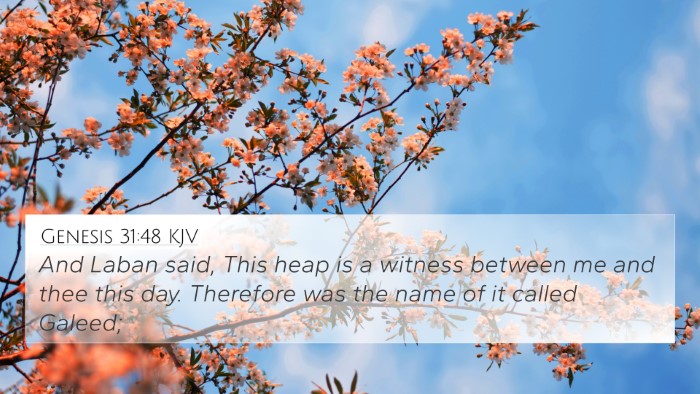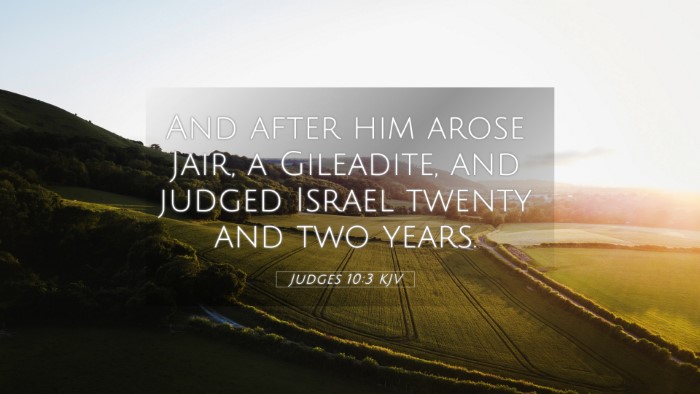Old Testament
Genesis Exodus Leviticus Numbers Deuteronomy Joshua Judges Ruth 1 Samuel 2 Samuel 1 Kings 2 Kings 1 Chronicles 2 Chronicles Ezra Nehemiah Esther Job Psalms Proverbs Ecclesiastes Song of Solomon Isaiah Jeremiah Lamentations Ezekiel Daniel Hosea Joel Amos Obadiah Jonah Micah Nahum Habakkuk Zephaniah Haggai Zechariah MalachiJudges 10:3 Similar Verses
Judges 10:3 Cross References
And after him arose Jair, a Gileadite, and judged Israel twenty and two years.
Uncover the Rich Themes and Topics of This Bible Verse
Listed below are the Bible themes associated with Judges 10:3. We invite you to explore each theme to gain deeper insights into the Scriptures.
Judges 10:3 Cross Reference Verses
This section features a detailed cross-reference designed to enrich your understanding of the Scriptures. Below, you will find carefully selected verses that echo the themes and teachings related to Judges 10:3 KJV. Click on any image to explore detailed analyses of related Bible verses and uncover deeper theological insights.

Genesis 31:48 (KJV) »
And Laban said, This heap is a witness between me and thee this day. Therefore was the name of it called Galeed;

Numbers 32:29 (KJV) »
And Moses said unto them, If the children of Gad and the children of Reuben will pass with you over Jordan, every man armed to battle, before the LORD, and the land shall be subdued before you; then ye shall give them the land of Gilead for a possession:
Judges 10:3 Verse Analysis and Similar Verses
Understanding Judges 10:3
Judges 10:3 states: "And after him arose Jair, a Gileadite, and judged Israel twenty and two years." This brief account, while simple in wording, carries profound implications within the biblical narrative and themes of leadership, deliverance, and Israel's cyclical struggle with sin and redemption.
Context of Judges 10:3
This verse follows the narrative of Abimelech and provides insight into the period of the Judges, a time characterized by regional leaders who arose to deliver Israel from oppression. The mention of Jair, a Gileadite, serves as both a historical marker and a theological commentary on the nature of Israel's governance.
Insights from Commentaries
-
Matthew Henry:
Henry notes that Jair's leadership should be viewed in the context of spiritual and moral deterioration among the Israelites. His long tenure of twenty-two years is indicative of relative peace, but it also masks the underlying failings of God's people to remain faithful. This sets the stage for subsequent cycles of apostasy and deliverance.
-
Albert Barnes:
Barnes emphasizes the geographical significance of Jair being a Gileadite, pointing out that Gilead was known for its rugged terrain and warrior culture. He implies that this selection aligns with God’s providence in raising leaders who embody strength and resilience, which the Israelites needed in their tumultuous times.
-
Adam Clarke:
Clarke draws attention to the name "Jair," which means "he will enlighten." This reflects a deeper spiritual symbolism where leaders are not only judges but also bearers of wisdom and guidance for the people. Clarke posits that such leaders are essential during times when Israel struggles with moral clarity.
Thematic Analysis of Judges 10:3
The verse encapsulates several critical themes as seen through different Bible verse cross-references:
1. Leadership and Governance
- Judges 2:16: "Nevertheless, the LORD raised up judges, which delivered them out of the hand of those that spoiled them."
- 1 Samuel 12:1-2: "And Samuel said unto all Israel, Behold, I have hearkened unto your voice in all that ye said unto me..."
2. Patterns of Apostasy
- Judges 2:11-12: "And the children of Israel did evil in the sight of the LORD, and served Baalim."
- Romans 1:21-23: "...they became vain in their imaginations, and their foolish heart was darkened."
3. God’s Deliverance
- Psalms 68:5: "A father of the fatherless, and a judge of the widows, is God in his holy habitation."
- Isaiah 33:22: "For the Lord is our judge, the Lord is our lawgiver, the Lord is our king; he will save us."
Connecting Judges 10:3 to Other Bible Verses
Linking Bible scriptures to Judges 10:3 provides a deeper understanding of its context and themes. Notably, the cyclical nature of Israel's faithfulness and the subsequent need for deliverance can be traced through various biblical texts:
- Numbers 32:40-42: References the lands of Gilead and Jair's legacy.
- John 10:11: Jesus as the Good Shepherd parallels the role of judges as leaders.
- Hebrews 11:32-34: Mentions Jephthah and Gideon, who alongside Jair exemplify faith and leadership.
- Micah 3:1: Calls for justice and righteousness, reflecting on the expectations for Israel's judges.
- Acts 13:20: Acknowledges the judges and their role in God's plan during Israel's history.
Applications of Judges 10:3 Today
For contemporary readers, understanding Judges 10:3 involves asking questions about leadership, fidelity to God, and the consequences of collective behavior. The exhortations found in this verse encourage reflection on how societies choose their leaders and the lasting impact of these choices.
Practical Considerations:
- Identifying connections between Old and New Testament: Reflect on how leaders today can embody the principles illustrated through biblical judges.
- Cross-reference Bible study: Utilize tools for Bible cross-referencing to explore further links within scripture concerning leadership and governance.
- Cross-referenced themes in the Bible: Dive deeper into themes of deliverance across both testaments.
Conclusion
Judges 10:3 reminds believers of the significance of God's chosen leaders and the cyclical nature of Israel's faithfulness. By employing a comparative Bible verse analysis, we can glean insights that shed light on the recurring patterns of scripture. Additionally, understanding these connections enriches one's study, providing tools for deeper spiritual engagement and reflection.


